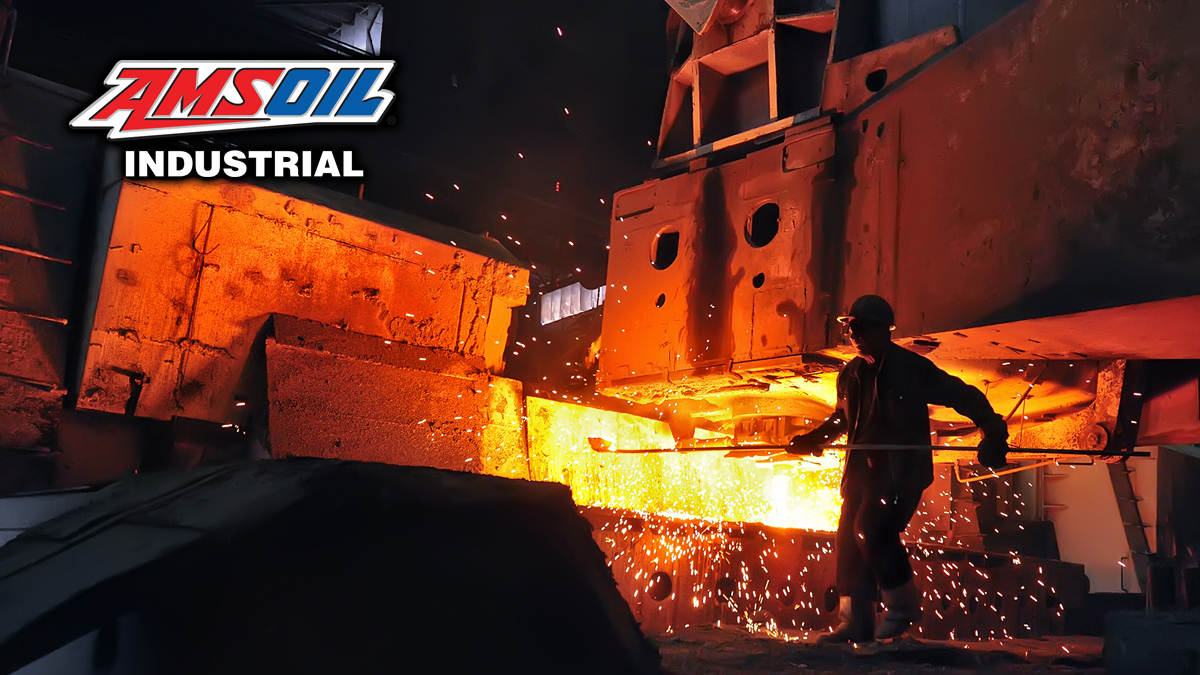How to Keep Your Equipment Running When the Heat Is On
In demanding industrial environments, equipment doesn’t just operate — it endures. From manufacturing and forging to power generation and heavy-duty processing, machines in high-temperature applications face extreme conditions that push lubricants to their limits.
Choosing the wrong lubricant can lead to oxidation, varnish, component failure and unplanned downtime. On the other hand, the right high-temperature lubricant can enhance reliability, reduce maintenance frequency and extend equipment life.
Why High-Temperature Lubrication Is Different
As temperature increases, lubricants undergo chemical and physical changes that affect their performance. The most common issues include:
Oxidation: Heat accelerates chemical breakdown, producing sludge, acids and varnish that can clog lubrication systems and reduce the efficiency of machinery critical to operations in steel mills, foundries and other types of industrial plants subjected to high temperatures.
Viscosity Loss: Thinner oil at elevated temperatures can reduce film strength and load-carrying capacity. In high-temperature environments, this means reduced protection for heavy-duty components, leading to increased wear under extreme loads.
Evaporation: Loss of base oil and additives leads to dry running and wear. In industrial applications, this can lead to higher friction and premature failure of machines operating in high-temperature environments.
Coking or Carbon Formation: Leaves behind hard deposits that impair system performance. These deposits can obstruct vital systems, causing downtime and costly maintenance.
Selecting the correct lubricant means understanding how these variables play out in your specific application.
Key Considerations for High-Temperature Lubricant Selection
1 – Base-Oil Type Matters
The base oil sets the foundation for temperature tolerance:
• Mineral Oils: Generally suitable for up to 200°F (93°C) but degrade rapidly at higher temperatures.
• Synthetic Hydrocarbons (PAOs): Excellent thermal stability, ideal for sustained temps up to 250°F (121°C).
• Esters and PAGs: Even greater high-temp resistance and cleanliness; ideal for ovens, conveyors and air compressors.
• Silicones and PFPEs: Extreme high-temp stability up to 600°F+ (315°C), often used in specialty or sealed-for-life applications.
AMSOIL Industrial synthetic lubricants provide enhanced oxidation resistance and high viscosity index for reliable performance across wide temperature ranges.
2 – Viscosity at Operating Temperature
Don’t rely solely on generic ISO-grade lubricants. Evaluate the viscosity needed at your specific oil temperature during operation. This will ensure optimal oil viscosity to meet the equipment requirements. Too thin, and you’ll get metal-to-metal contact. Too thick, and you risk energy loss or inadequate flow.
Use lab testing or consult an AMSOIL Industrial Application Engineer to determine the optimal viscosity for your conditions.
3- Oxidation and Thermal Stability
Look for lubricants with high oxidation resistance, particularly in systems where recirculation or long drain intervals are required. Oxidation-resistant oils help:
• Extend fluid life
• Prevent sludge and varnish buildup
• Maintain system cleanliness
AMSOIL Industrial offers high-temperature lubricants that resist breakdown and deposit formation under extreme heat and load.
4- Additive Package Compatibility
Ensure the lubricant’s additive system is designed for high thermal loads. Look for:
• Anti-wear (AW) and extreme-pressure (EP) additives provide load protection.
• Antioxidants help slow degradation.
• Detergents and dispersants keep systems cleaner.
AMSOIL products are engineered with balanced chemistry to provide protection without contributing to varnish.
5- Application Environment and Contamination Risk
In harsh environments (dust, moisture, chemicals), high heat only amplifies contamination risks. Choose lubricants with:
• Good water resistance and demulsibility
• Strong sealing and film strength properties
• Proven performance in dirty or abrasive conditions
AMSOIL Industrial Solutions for High-Temperature Demands
From synthetic compressor oils and high-temp greases to gear and hydraulic oils, AMSOIL Industrial provides purpose-built products for high-heat applications. These include:
• High-viscosity-index synthetics that maintain stability across wide-temp swings.
• Low-volatility formulas to reduce evaporation loss.
• Oxidation-resistant oils that protect critical components and extend service intervals.
Our application engineers work with maintenance teams to identify lubrication pain points and recommend solutions tailored to your operating environment.
Don’t Let Heat Derail Your Equipment
High-temperature applications demand more from your lubricant – and your maintenance strategy. By choosing the right products and leveraging expert support, you can minimize wear, prevent failures and ensure your systems operate efficiently, even under pressure.
Ready to improve equipment reliability in high-temp environments?
Connect with an AMSOIL Industrial Application Engineer today.
